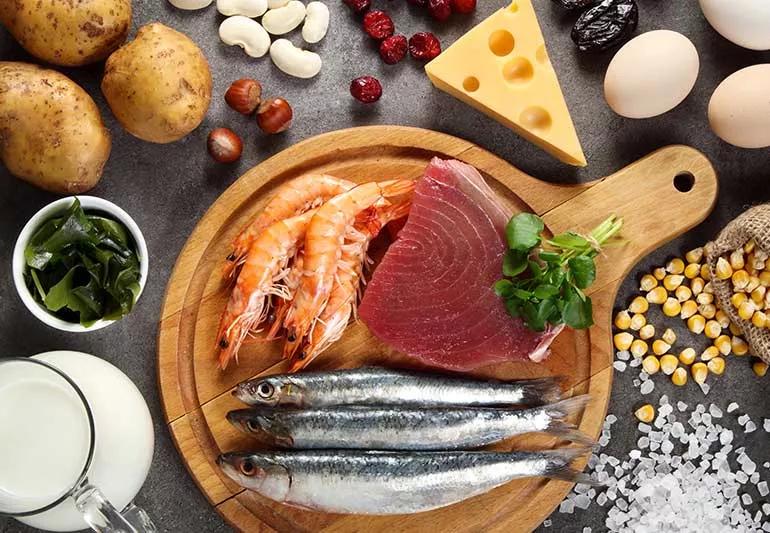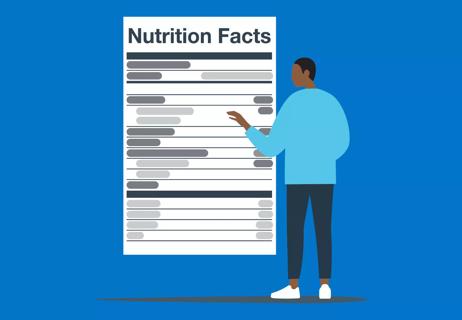Advertisement
Pass the (iodized) salt to support your thyroid, disinfect a wound and more

Salt gets a bad rap. Grumpy people are “salty.” Making something worse is known as “rubbing salt in the wound.” But the truth is, salt containing iodine should make you anything but grumpy — it’s beneficial for your health (and your wounds).
Advertisement
Cleveland Clinic is a non-profit academic medical center. Advertising on our site helps support our mission. We do not endorse non-Cleveland Clinic products or services. Policy
“Iodine, which can be added to table salt, is an essential mineral found naturally in soil and the ocean,” says registered dietitian Julia Zumpano, RD, LD. “It’s critical at every stage of life and has a precise role, so it’s important to get enough iodine without overdoing it.”
Zumpano shares how iodine can boost your health and how much you really need.
Iodine, also called iodide, helps your body develop and function throughout your entire life, starting in fetal development. It can also help treat or prevent some sicknesses and diseases.
Your thyroid hormones are essential for overall health. They help regulate:
“But your body can’t make thyroid hormones without iodine,” Zumpano says. “The amount of iodine in your system can affect how much thyroid hormone your thyroid produces.”
Your thyroid gland, part of your endocrine system, traps iodine in your system and turns it into thyroid hormones. If your body makes too much of the hormone (hyperthyroidism) or too little (hypothyroidism), it can affect critical bodily functions.
If you develop thyroid disease or thyroid cancer, iodine can help in a few ways:
Sometimes, thyroid disease or noncancerous thyroid cysts can cause a goiter (enlarged thyroid gland). Goiters are more likely to develop if you live with an uncontrolled thyroid condition or have an iodine deficiency. Iodine helps regulate your thyroid and reduce the risk of goiters.
Too much thyroid hormone can speed up body processes, causing:
To help reduce the amount of thyroid hormone your body produces, healthcare providers may use radioactive iodine (RAI). It’s a form of iodine (prescribed in pill or liquid form) used to destroy thyroid cells so they can’t continue to take up and hold onto iodine.
RAI therapy can treat certain types of thyroid cancer. It’s commonly used following surgery to destroy any remaining cancer cells and thyroid tissue. RAI therapy tends to be most successful when used to treat thyroid cancer that has spread beyond the thyroid.
Advertisement
Thyroid hormones support brain development and function throughout life, beginning in utero, when a fetus is developing during pregnancy. Having enough iodine to make enough thyroid hormones is critical.
The American Thyroid Association and American Academy of Pediatrics recommend that people who are pregnant, planning to become pregnant or breastfeeding (chestfeeding) take a prenatal multivitamin containing 150 micrograms (mcg) of iodine. But not all prenatal vitamins contain iodine.
Pregnant and breastfeeding people should consume almost double the amount of iodine to provide enough for themselves and healthy fetal development, Zumpano advises. “Without it, there is a higher risk for neurological disability and issues with growth and sexual development.”
Infants are also at risk for iodine deficiency, especially if exclusively breastfed. Breast milk contains iodine, but the amount that ends up in the breast milk depends on how much the person breastfeeding consumes.
If your child is a picky eater or eats a restricted diet, make sure they’re getting enough iodine. Not getting enough can affect how their thinking and reasoning skills develop.
“There’s no evidence that not getting enough iodine here or there has neurological effects,” Zumpano notes. “But going a long time without getting the necessary iodine can affect their continuing brain development.”
Children with an ongoing moderate to severe deficiency may have reduced intelligence compared with children receiving enough iodine.
Fibrocystic breast change is a noncancerous condition that causes painful breast lumps and tenderness. It affects 50% of women and people assigned female at birth (AFAB) during reproductive age, and may increase the risk of breast cancer.
Experts recognize iodine deficiency as a possible factor causing fibrocystic breasts. One older study reported that iodine therapy can help relieve the symptoms of fibrocystic breast changes.
Iodine is available as a topical antiseptic called povidone-iodine. You put it on mild cuts, wounds and burns. It kills bacteria and helps prevent or treat infection without delaying healing.
Advertisement
The amount of iodine you should get daily depends on your age and condition. The National Institutes of Health (NIH) recommends:
| Age | Recommended dietary allowence |
|---|---|
| Recommended dietary allowance | 110 micrograms |
| Infants 7 to 12 months | 130 micrograms |
| Children 1 to 8 years | 90 micrograms |
| Children 9 to 13 years | 120 micrograms |
| Teens 14 to 18 years | 150 micrograms |
| Adults | 150 micrograms |
| Pregnant people | 220 micrograms |
| Breastfeeding (chestfeeding) people | 290 micrograms |
| Age | |
| Recommended dietary allowance | |
| Recommended dietary allowence | |
| 110 micrograms | |
| Infants 7 to 12 months | |
| Recommended dietary allowence | |
| 130 micrograms | |
| Children 1 to 8 years | |
| Recommended dietary allowence | |
| 90 micrograms | |
| Children 9 to 13 years | |
| Recommended dietary allowence | |
| 120 micrograms | |
| Teens 14 to 18 years | |
| Recommended dietary allowence | |
| 150 micrograms | |
| Adults | |
| Recommended dietary allowence | |
| 150 micrograms | |
| Pregnant people | |
| Recommended dietary allowence | |
| 220 micrograms | |
| Breastfeeding (chestfeeding) people | |
| Recommended dietary allowence | |
| 290 micrograms |
Most people living in the United States get enough iodine from their diet. If you have thyroid issues, talk to your doctor about the foods and supplements you should avoid.
The three most common sources of iodine include:
Zumpano cautions that while it’s important to get the iodine you need, you can get too much — typically, when supplements are involved. Getting too much iodine can cause:
Iodine also interacts with some medications, including some:
“Before taking supplements for iodine, or any essential nutrients, talk to your healthcare provider,” Zumpano recommends. “The goal is always to benefit your health, not put it at risk.”
Advertisement
Learn more about our editorial process.
Advertisement

What’s on your plate can either help power you through your day or put you in nap mode

Information on serving size, calories and nutrients can help you make healthy choices

Often labeled as ‘diabetes-friendly’ or ‘calorie-free,’ these sugar substitutes warrant caution

Repeating your meals can help simplify meal planning and counting calories, but it could also lead to boredom and nutritional deficiencies

Making certain food and lifestyle choices can help keep your battery full

Supplements with colloidal silver offer no proven health benefits and could be harmful

Fiber-rich shirataki noodles may improve blood sugar, aid in digestion and help with weight loss

Reducing inflammation is key when you’re in a flare-up, but so is having a preventive nutritional plan in place when you’re not

Focus on your body’s metabolic set point by eating healthy foods, making exercise a part of your routine and reducing stress

PFAS chemicals may make life easier — but they aren’t always so easy on the human body

While there’s little risk in trying this hair care treatment, there isn’t much science to back up the claims